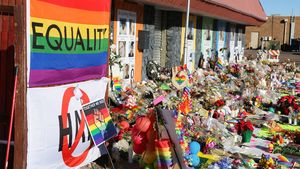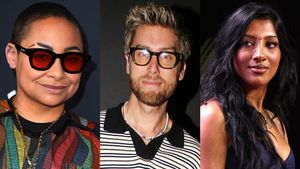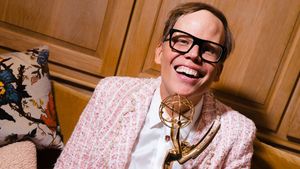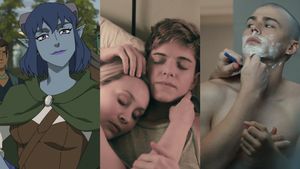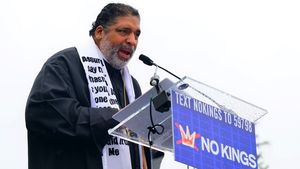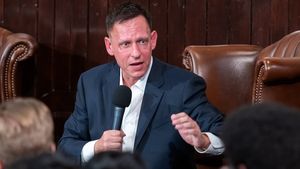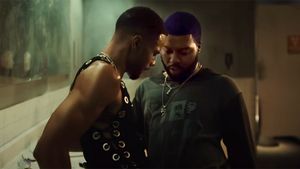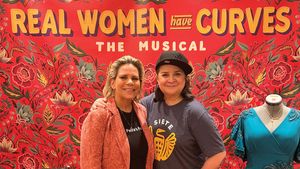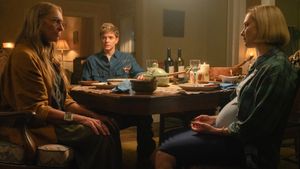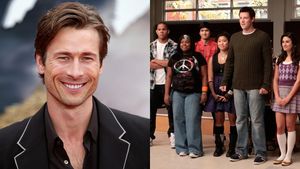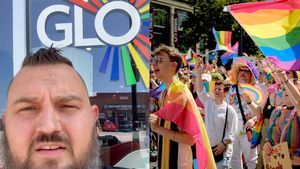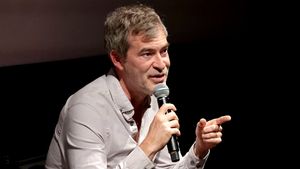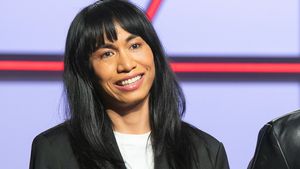Treatment GuideJust DiagnosedSex & DatingAfrican AmericanStigmaAsk the HIV DocPrEP En EspañolNewsVoicesPrint IssueVideoOut 100
CONTACTCAREER OPPORTUNITIESADVERTISE WITH USPRIVACY POLICYPRIVACY PREFERENCESTERMS OF USELEGAL NOTICE
© 2025 Pride Publishing Inc.
All Rights reserved
All Rights reserved
By continuing to use our site, you agree to our Privacy Policy and Terms of Use.
Whether the starting point is the eight cases of Karposi's sarcoma in New York City in March 1981 or the five cases of pneumocystis pneumonia in Los Angeles in June that same year, it's been three decades since AIDS began ravaging our readers' lives and teaching all of us to live more carefully, love more fervently, and lead by example. These 30 quotes are just a small sampling of the fear, fight, and feats that got us to where we are today.
'We are seeing the beginning of a major epidemic of cancer. The disease happens to be occurring in the gay community, but what is really relevant is whatever conditions are causing Kaposi's [sarcoma]. We are very concerned to head off a panic.'
- Alvin Friedman-Kien, MD, of the New York University Medical Center, 1981
'So far, no one knows with certainty what causes the fatal 'new' diseases. Heterosexuals, one person in a monogamous relationship and not the other, even infants have succumbed. Yet many cases are centered in the gay men's community, especially in New York City. Most of us who know a lot of gay men also know one or more who have died. Living with this situation feels a bit like it must have felt to be alive when the plague was decimating the population of Europe.'
- David Goodstein, president of Liberation Publications, publisher of The Advocate, in a letter to readers, 1983
'AIDS is a sex-related disease, and we in the religious community have not gotten our act together on sexuality.'
- The Reverend Carl Flemister, executive minister of the American Baptist Churches of Metropolitan New York, discussing the spread of HIV, 1985
'Two and a half years ago, my friends wondered why I was doing this.'
- Lynn Paleo, who worked with the San Francisco AIDS Foundation, in a feature about lesbians' involvement in AIDS activism, 1986
'My volunteer life at this point is limited exclusively to health education against contracting AIDS. We've been deluged with threats and the worst possible hype'media hype'about the dangers of AIDS. Yet there have been very few sound voices coming through saying, 'Yes, times are tough and they may get worse, but we can do something about it.' That's what I'm trying to do.'
- Actress Zelda Rubinstein on her involvement in an early AIDS awareness ad campaign, 1986
'When confronted with our own mortality, it has become common in our community to have our bodies cremated and our ashes thrown to the four winds. But with the wind goes an important part of our history. And also an important part of our future. I ask you to consider the ramifications of this action on tomorrow's generation of lesbians and gays as they search for self-esteem. As a person with AIDS, I have thought about this a great deal. I believe that we must be the same activists in our deaths that we were in our lives. I urge those of you who are facing death to find a method of leaving a lasting record of our accomplishments'including the acknowledgment that you were lesbian or gay.'
Activist and former Air Force sergeant Leonard Matlovich, 1987
'Now I deal regularly with the phenomenon of young men who come up after a concert, with tears in their eyes, and say, 'I just want to thank you.' And without them saying it, I know they've had a friend who has died of AIDS.'
- Folksinger and songwriter Joan Baez, 1987
'Mr. Reagan, did you explain'that sometimes ignorant people act in such a way [toward people with AIDS] that it is frightening...How long is it going to take before people get smart? We're not talking about illiterate people. We're talking about senators and congressmen and the fucking president.'
- Actress Whoopi Goldberg, speaking at the 1987 March on Washington
'It's so beautiful. I think it is a strengthening and empowering statement of hope and remembrance. If people come away from here with anything, I want it to be love, love for our community. I want people who come here to understand that even as this epidemic continues, we're a good people, we're loving people, we take care of each other, and we've got the strength and the will to beat this disease.'
- Activist Cleve Jones at the launch of the AIDS Memorial Quilt at the 1987 March on Washington
'Remember that someday the AIDS crisis will be over. And when that day has come and gone, there will be people alive'gay and straight people, black and white people, men and women'who will hear that once there was a terrible disease and that a brave group of people stood up and fought and in some cases died so others might live and be free. I'm proud to be with the people I love'those who are fighting this war'and to be a part of that fight. And after we kick the shit out of this disease, I intend to be alive to kick the shit out of this system so that it will never happen again.'
- Film critic, author, and GLAAD cofounder Vito Russo at the October 1988 ACT UP FDA protest
'At first, I waited politely for the president to respond to the epidemic... After about a year, I realized the government wasn't going to do anything, so I started doing safer-sex education with community-based AIDS organizations. By 1985, it was becoming clear that we needed to take this a step further, that civil disobedience would be as important as caregiving if we wanted real change.'
- Waiyde Palmer, an activist who helped organize an AIDS protest during a 1989 San Francisco Opera performance of Falstaff
'Now that I've resigned myself to living, how am I going to make something of it? There's a question I ask myself and ask of everybody who is struggling to heal themselves, everybody who is dealing with AIDS, dealing with being gay, dealing with this painful world: 'Where is your passion? Why do you love, and what are you doing about it?' '
- Choreographer Bill T. Jones, 1990
'I wanted to do something about AIDS through the eyes of the gay community. There was nothing else out there, and people kept saying, 'Why is this still a taboo subject?''
- Lindsay Law, executive producer of the film Longtime Companion, 1990
'I've lost incredible numbers of people. I'm to the point where I don't even remember who's alive anymore... Some days I just assume everybody's dead. I went through a one-year period where I'd say that I just don't have anyone I love anymore. I had one friend whose ashes are buried in my backyard. I've done four quilts, and that's just for people no one else had done it for.'
Actor and playwright Harvey Fierstein, 1991
'I tell people when I go out to speak that no matter how people got this virus, we've got to open our arms up to everybody'not just to me because I'm heterosexual. Until you're able to educate society'not just about AIDS and HIV but about gays and stuff'they're always going to say and do stupid things.'
- Retired basketball player Magic Johnson, 1992
'In 1986, when a great number of people that I knew had already died and were infected, I just assumed that I was infected also, because I couldn't imagine why I wouldn't have been. Finally, I had the courage to go and get the test, which was one of the scarier moments of my life. I found out that I was HIV-negative. At first I didn't understand it, and then I felt guilty because so many friends of mine were dealing with this issue and I had been released from this burden. After a period of time, I thought, I'm a very lucky man, and I have to show up in this problem, not because I'm fighting for my own life but because I have to be a part of this fight. I've been extraordinarily fortunate in many ways, and I want to be a part of the solution.'
- Producer and philanthropist David Geffen, 1992
'I hear people say, 'Oh, gee, wasn't it horrible then?' but it's just as horrible now. It's just on a grander scale. Instead of spending $20 million, we spend $2 billion, but instead of having 10,000 cases, now we have 200,000 cases.'
- Randy Shilts, former Advocate staffer and author of And the Band Played On, 1993
'For those with HIV, never despair, never give up, because things are happening all the time, because we will get there someday, and it could be even sooner than some of us dare to expect.'
- Mathilde Krim, founding chairman of amfAR, 1993
'Slick Willie, the Republicans were right. We should never have trusted you. You are doing nothing while we die. One year later, lots of talk, but no action. Bill, while me and my community are dying in ever-increasing numbers, all you do is talk.'
- ACT UP member Luke Montgomery ('Luke Sissyfag'), who interrupted a speech by President Bill Clinton at an AIDS ward at Georgetown University Medical Center, 1994
'I wonder now as I look around me, Who is going to carry my torch?'
- Television personality and AIDS educator Pedro Zamora, testifying before Congress, 1994
'I heard this big, hollow thud, and then I found myself in the water. I just held my head in the hopes' I [didn't] know if I was cut or not. But I wanted to keep the blood in or just not let anybody touch it. Dealing with HIV was really difficult for me because I felt like, God, the U.S. Olympic Committee needs to know about this. But I didn't anticipate hitting my head on the board. That's where I became paralyzed with fear.'
- Olympian Greg Louganis, telling Barbara Walters about his diving accident during the 1988 Games, 1995
'I remember complaining, 'Why isn't anybody doing anything? Why isn't anyone raising money?' And it struck me like lightning: 'Wait a second, I'm not doing anything.' So with the help of several other people, we put on the first-ever gay benefit here, the Commitment to Life. Betty Ford was the guest of honor, and it took about a year to put together. I've never heard so many nos in my life. Oh, my God, it was unbelievable! Nobody in this town wanted to know or be a part of it. They said, 'No, this is one where you want to stay away from. There's a stigma.' I didn't even know that Rock Hudson was sick yet. I found that out two or three months after I was involved.'
- Actress and activist Elizabeth Taylor, 1996
'[As gay men] we're conditioned to think that we're always at risk for HIV. I know that anytime I've gone for an HIV test, I always worry, even if I know I didn't engage in unsafe sexual behavior or inject drugs.'
- Jos' Zuniga, a volunteer for a 1997 live-virus HIV vaccine trial
'The first year of Gay Men's Health Crisis and the first four years of ACT Up were some of the most exciting years I have ever felt in my entire life. I have never felt such love, support, and energy among all of us fighting for common goals.'
- Author and activist Larry Kramer, 1999
'If my story can help people'anybody at all'it is positive. I've always tried to help people, whether it be as a gay man or a Mexican-American or now, as someone who
is HIV-positive.'
- National champion figure skater Rudy Galindo, 2000
'If we can create an engine called Microsoft that can put a computer in virtually every home in America, if we can create an engine called Nike that can put sneakers on the feet of people all over the world, then we have to begin to create engines'multibillion-dollar engines'that are addressing the great social causes of our time.'
- AIDS Rides founder Dan Pallotta, 2002
'Over time, while the pandemic has not left the GLBT community, it has vastly extended within the LGBT community and into other communities, including heterosexual women,
the majority of whom are women of color.'
- Ana Oliveira, executive director of Gay Men's Health Crisis, 2005
'At the tender age of 41 -- a year longer than I once thought I would live -- I have never felt better. HIV transformed my life, made me a better and braver writer, prompted me to write the first big book pushing marriage rights, got me to take better care of my health, improved my sex life, and deepened my spirituality.'
- Author and political pundit Andrew Sullivan, 2005
'Not until same-sex relationships are fully recognized as equal to opposite-sex relationships; not until a gay or bisexual soldier's sacrifice is equal to that of a straight soldier; not until we put an end to the chipping away of a young boy's self-esteem by bullying in the school yard; not until there is a time when the concern is not who we love but that we love will the stigma of HIV/AIDS fade. And only then will our nation do all it can to finally put an end to a disease that so significantly impacts gay and bisexual men and people of color.'
- A joint statement by Marjorie J. Hill, chief executive officer of Gay Men's Health Crisis; Rea Carey, executive director of the National Gay and Lesbian Task Force; and Paul Kawata, executive director of the National Minority AIDS Council, 2010
From our Sponsors
Most Popular
Grindr is reminding us why jockstraps are so sexy and iconic
May 02 2025 5:36 PM
BREAKING: Supreme Court rules to save free access to preventive care, including PrEP
June 27 2025 10:32 AM
Two right-wing Supreme Court justices signal they may uphold access to PrEP and more
April 21 2025 4:10 PM
Plus: Featured Video
Latest Stories
“I am the steward of my ship”: John Gibson rewrites his HIV narrative
September 16 2025 2:56 PM
“So much life to live”: Eric Nieves on thriving with HIV
September 03 2025 11:37 AM
The Talk: Owning your voice
August 25 2025 8:16 PM
The lab coat just got queer
August 21 2025 10:00 AM
Messenger RNA could be the key to an HIV vaccine — but government cuts pose a threat
August 20 2025 8:02 AM
The Talk: Beyond the exam room
August 13 2025 3:15 PM
The Talk: Navigating your treatment
August 01 2025 6:02 PM
The Talk: Starting the conversation
July 25 2025 4:47 PM
Thanks to U=U, HIV-positive people can live long, happy, healthy lives
July 25 2025 2:37 PM
How the Black AIDS Institute continues to fill in the gaps
July 25 2025 1:06 PM
“I felt like a butterfly”: Niko Flowers on reclaiming life with HIV
July 23 2025 12:22 PM
Dancer. Healer. Survivor. DéShaun Armbrister is all of the above
July 02 2025 8:23 PM
1985: the year the AIDS crisis finally broke through the silence
June 26 2025 11:24 AM
VIDEO: A man living with HIV discusses his journey to fatherhood
June 10 2025 4:58 PM
Trump admin guts $258 million in funding for HIV vaccine research
June 03 2025 3:47 PM
HRC holds 'die-in' to protest Trump health care cuts
April 28 2025 2:11 PM
500,000 Children at Risk: PEPFAR Funding Crisis
April 08 2025 3:51 PM
Broadway's best raise over $1 million for LGBTQ+ and HIV causes
April 03 2025 7:15 PM
Trending stories
Recommended Stories for You






























